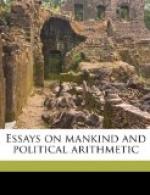He published in 1662 and 1685 a “Treatise of Taxes and Contributions, the same being frequently to the present state and affairs of Ireland,” of which his view started from the general opinion that men should contribute to the public charge according to their interest in the public peace—that is, according to their riches. “Now, he said, “there are two sorts of riches—one actual, and the other potential. A man is actually and truly rich according to what he eateth, drinketh, weareth, or in any other way really and actually enjoyeth. Others are but potentially and imaginatively rich, who though they have power over much, make little use of it, these being rather stewards and exchangers for the other sort than owners for themselves.” He then showed how he considered that “every man ought to contribute according to what he taketh to himself, and actually enjoyeth.”
In 1674 Sir William Petty published a paper on “Duplicate Proportion,” and in 1679 he published in Latin a “Colloquy of David with his Own Soul.” In 1682 he published a tract called “Quantulumcunque, concerning Money;” and “England’s Guide to Industry,” in 1686. From 1682 to 1687, the year of his death, Sir William Petty was drawing great attention to the “Essays on Political Arithmetic,” which are here reprinted. There was the little “Essay in Political Arithmetic, concerning the People, Housings, Hospitals of London and Paris;” published in 1682, again in French in 1686, and again in English in 1687. There was the little “Essay concerning the Multiplication of Mankind, together with an Essay on the Growth of London,” published in 1682, and again in 1683 and 1686. There was in 1683, “Another Essay in Political Arithmetic concerning the growth of the City of London.” There were “Farther Considerations on the Dublin Bills of Mortality,” in 1686; and “Five Essays on Political Arithmetic” (in French and English), “Observations upon the Cities of London and Rome,” in 1687, the last year of Sir William Petty’s life. Other writings of his were published in his lifetime, or have been published since his death. He was in the study of political economy one of the most ingenious and practical thinkers before the days of Adam Smith.
But the interest of those “Essays in Political Arithmetic” lies chiefly in the facts presented by so trustworthy an authority. London had become in the time of the Stuarts the most populous city in Europe, if not in the world. This Sir William Petty sought to prove against the doubts of foreign and other critics, and his “Political Arithmetic” was an endeavour to determine the relative strength in population of the chief cities of England, France, and Holland. His application of arithmetic in the first of these essays to a census of the population at the Day of Judgment he himself spoke of slightingly. It is a curious example of a bygone form of theological discussion. But his tables and his reasonings upon them grow in interest as he attempts his numbering




